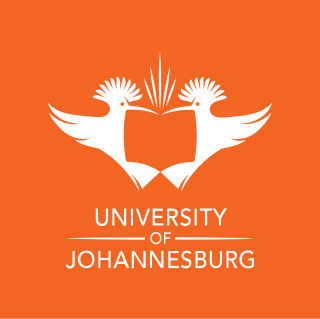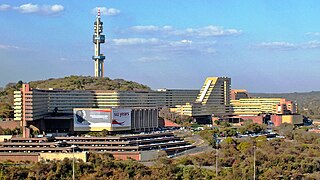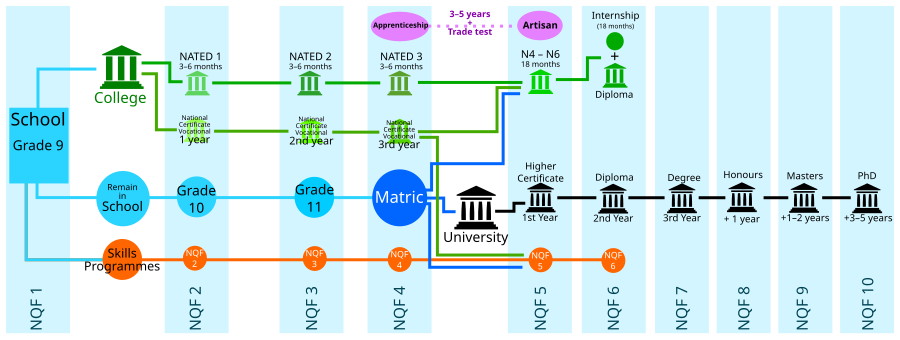
Outcome-based education or outcomes-based education (OBE) is an educational theory that bases each part of an educational system around goals (outcomes). By the end of the educational experience, each student should have achieved the goal. There is no single specified style of teaching or assessment in OBE; instead, classes, opportunities, and assessments should all help students achieve the specified outcomes. The role of the faculty adapts into instructor, trainer, facilitator, and/or mentor based on the outcomes targeted.

The University of Johannesburg (UJ) is a public university located in Johannesburg, South Africa. The University of Johannesburg came into existence on 1 January 2005 as the result of a merger between the Rand Afrikaans University (RAU), the Technikon Witwatersrand (TWR) and the Soweto and East Rand campuses of Vista University. Prior to the merger, the Daveyton and Soweto campuses of the former Vista University had been incorporated into RAU. As a result of the merger of Rand Afrikaans University (RAU), it is common for alumni to refer to the university as RAU. The vice-chancellor and principal of UJ is Professor Letlhokwa George Mpedi who took office on 1 January 2023. Between 2018 and 2022, UJ's vice-chancellor and principal was Tshilidzi Marwala.
A registered training organisation (RTO), in Australia, is an organisation providing Vocational Education and Training (VET) courses to students, resulting in qualifications or statements of attainment that are recognised and accepted by industry and other educational institutions throughout Australia.
Education Facilitators, a privately held company in South Africa, was a holding and operating company in the education management industry that consisted of three trading divisions, one in professional services and two college brands that operated throughout southern and central Africa from its founding in 1994 to its closure in 2005.

George Whitefield College is a Christian theological college in Muizenberg, Cape Town, South Africa.
A national qualifications framework (NQF) is a formal system describing qualifications. 47 countries participating in the Bologna Process are committed to producing a national qualifications framework. Other countries not part of this process also have national qualifications frameworks.
The Hong Kong Council for Accreditation of Academic and Vocational Qualifications (HKCAAVQ), (HKCAA) is a statutory body established under the HKCAAVQ Ordinance which came into effect on 1 October 2007.

The University of South Africa (UNISA) is the largest university system in South Africa by enrollment. It attracts a third of all higher education students in South Africa. Through various colleges and affiliates, UNISA has over 400,000 students, including international students from 130 countries worldwide, making it one of the world's mega universities and the only such university in Africa.
The European Qualifications Framework (EQF) acts as a translation device to make national qualifications more readable across Europe, promoting workers' and learners' mobility between countries and facilitating their lifelong learning. The EQF aims to relate different countries' national qualifications systems to a common European reference framework. Individuals and employers will be able to use the EQF to better understand and compare the qualifications levels of different countries and different education and training systems. Since 2012, all new qualifications issued in Europe carry a reference to an appropriate EQF level.
The Malaysian Qualifications Framework or the MQF is a unified system of post secondary qualifications offered on a national basis in Malaysia. It is administered by the Malaysian Qualifications Agency (MQA), a statutory body under the purview of the Ministry of Higher Education (MOHE).
In the UK education sector, there are a wide range of qualification types offered by the United Kingdom awarding bodies. Qualifications range in size and type, can be academic, vocational or skills-related, and are grouped together into different levels of difficulty. In England, Wales and Northern Ireland, qualifications are divided into Higher Education qualifications, which are on the Framework for Higher Education Qualifications (FHEQ) and are awarded by bodies with degree awarding powers, and Regulated qualifications, which are on the Regulated Qualifications Framework (RQF) and are accredited by Ofqual in England, the Council for the Curriculum, Examinations and Assessment in Northern Ireland and Qualifications Wales in Wales. In Scotland, qualifications are divided into Higher Education qualifications, Scottish Qualifications Authority qualifications and Scottish Vocational Qualifications/Modern Apprenticeships, which are on the Scottish Credit and Qualifications Framework (SCQF). Scottish Higher Education Qualifications are on both the SCQF and the FHEQ.
Open Window is an accredited private higher education provider. It was established in 1993 as an art school. It has since expanded into an institute offering three bachelor's degrees, postgraduate degrees and accredited certificates.
Higher education accreditation is a type of quality assurance process under which services and operations of post-secondary educational institutions or programs are evaluated to determine if applicable standards are met. If standards are met, accredited status is granted by the agency.

The CTI Education Group (CTI) was a registered, private higher education institution in South Africa. Full-time and part-time students can study within the fields of Information Technology, Psychology & Counselling, Creative Arts & Graphic Design, Commerce and Law on campuses spread throughout South Africa.
The Tertiary Education Quality and Standards Agency (TEQSA) is Australia's independent national quality assurance and regulatory agency for higher education.
The Namibia Qualifications Authority (NQA) is a statutory body in Namibia, regulated in terms of the National Qualifications Framework Act No 29 of 1996. It is made up of 29 members appointed by the Minister of Education in consultation with the Minister of Labour. The NQA is mandated by legislation to oversee the development and implementation of the National Qualifications Framework (NQF).
The Mauritius Qualifications Authority (MQA) is the government organisation responsible for setting educational standards and accrediting qualifications.
The national qualification frameworks in the United Kingdom are qualifications frameworks that define and link the levels and credit values of different qualifications.

The South African Institute for Heritage Science and Conservation is a higher learning institution, founded in 1994. The Institute's faculty buildings and support facilities are situated on a 15-hectare campus in the village of Twee Riviere, in the Langkloof valley, adjacent to the Southern Cape Region of South Africa. This is also the seat of its resident, full-time, postgraduate academic programme, which admits a maximum of twelve students annually for postgraduate studies in the specialist domain of conservation science.
A qualifications framework is a formalized structure in which learning level descriptors and qualifications are used in order to understand learning outcomes. This allows for the ability to develop, assess and improve quality education in a number of contexts. Qualifications frameworks are typically found at the national, regional, and international level.







